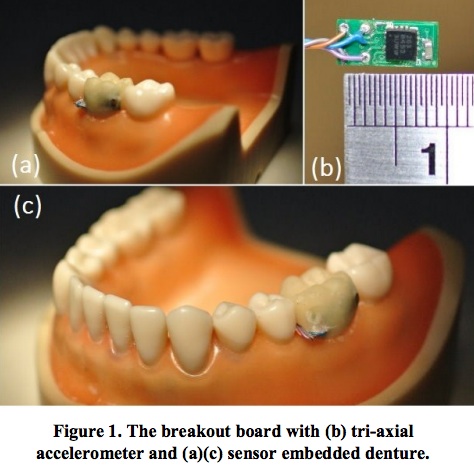 One of the mantras for the quantified self movement seems to be that no place is off-limits for a sensor. MobiHealthNews has written about sensors in clothing, belt sensors, brain wave sensors on the forehead, ingestible sensors, sensors in toothbrushes and sensors in forks. Now a team of researchers from the National Taiwan University in Taipei have found a new wearable use case -- a tiny accelerometer for your teeth.
One of the mantras for the quantified self movement seems to be that no place is off-limits for a sensor. MobiHealthNews has written about sensors in clothing, belt sensors, brain wave sensors on the forehead, ingestible sensors, sensors in toothbrushes and sensors in forks. Now a team of researchers from the National Taiwan University in Taipei have found a new wearable use case -- a tiny accelerometer for your teeth.
"The human mouth is one part of the human body that is almost always in constant use," the authors write in the study. "We use our mouth to perform some of the most important daily functions, such as eating, drinking, speaking, coughing, breathing, and smoking. Because our mouth is an opening into assessing the health of the human body, it presents the opportunity for the placement of a strategic sensor for detecting human oral activities."
The team from Taipei tested their sensor, designed to be embedded in an artificial tooth, with eight participants, each performing four activities: chewing, speaking, drinking, or coughing. The sensor could distinguish between the four with 93.8 percent accuracy when data from all eight participants was included in the algorithm, and with 59.8 percent accuracy when data from only the other seven participants was used.
Researchers designed the sensor to connect wirelessly via Bluetooth to a mobile device, but for the study they just used thin wires connected to an external data logging device -- not very convenient for day-to-day wear. In addition, since it wasn't feasible to equip study participants with an artificial tooth, researchers instead attached the sensor to the exterior of the participants' teeth with dental adhesive.
The study authors are vague on the use cases for their sensor, citing "dietary tracking" and "food and fluid intake monitoring". Certainly the sensor could be useful for helping dedicated trackers see how much they eat and drink -- although they would still have to rely on manual entry to describe the contents of their diet. This could be potentially valuable though, since an inequity still exists between quantifying calories burned, which technology does well, and quantifying calories consumed, which is still an elusive feature.
However, the potential implications go beyond food tracking. The study authors cite existing products like a smart mouthguard from X2 Biosystems that measures athletes' head hits, a "tooth tattoo" that can measure breathing and detect bacteria in saliva, and sensors in dentures used to measure tongue and teeth interactions during speech production. These suggest applications for a sufficiently advanced tooth-based sensor in sports medicine, dentistry, or even speech therapy.
















